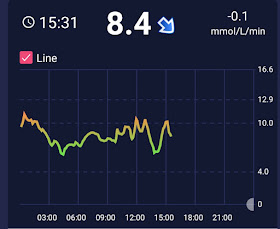It feels like it's been a long time coming for UK based people living with Type 1 Diabetes. The Freestyle Libre 2, the sequel to the box office smash original, is now here and is available to eligible diabetics on the NHS.
I don't really do reviews. If you've seen my vlog then you'll probably be aware that I focus my attention on talking to other people living with diabetes, sprinkled with the odd rant about whatever issue is burning in my belly at the time. So, I'm going to keep this "plain English" and try to focus on areas which I think are important to me. If you're especially interested in an area that I don't touch upon then do leave a comment below or get in touch via the usual channels.
What's in the box?
Does it look familiar? If you've used the original Libre then it probably will! It's exactly the same thing. All your old favourites are here; Insertor, applicator, 2 handy alcohol wipes and an instruction manual which you've never read. There isn't anything noticeably new. Even the outer packaging looks the same apart from a number 2.
Not that the packaging really matters, aside from the waste (I'll get on to that soon). You're not really here for that. You're here because it's new and you've heard it works "like a proper CGM". It's true, it does.
Users of Libre 1 can turn their sensors into a CGM via a nifty piece of kit called a Bubble or a Miao Miao. Essentially, both are Bluetooth devices that can sit on the top of your Libre sensor, taking in all that lovely data. That can then be sent directly to your phone and an app such as Diabox. No need for scans! Cool! Well, yes apart from the need to purchase a third party piece of hardware and turn a reasonably flat piece of tech, in the Libre sensor, into quite a bulky lump on your arm (or wherever you choose to wear yours).
"Hold my pint!" exclaimed the boffins at Abbott and they set to work to remove the need for a third party device, uglying up their little discs of loveliness. The result is Libre 2 and it works just like Libre 1 did with Bubble or Miao Miao.
Accuracy!? Tell me about the accuracy!
No blinding with science, here. If you want to hear about MARD and the likes then those figures are freely available on other good web sites, and some bad ones. For me, so far, I think it's as good if not better than Libre 1. I've tested it against my most trusted blood glucose monitor at different times of the day, when high and when low and it's pretty close, sometimes exact. Day 1 was a little "out" on the numbers but I was expecting that after reading about similar stories on social media. It did settle down after around 6 hours.
Diabox? Huh?
There may be other ways of turning Libre 2 into a CGM. You may want to explain those to me! Feel free by using the comments box below. I've heard of some sort of patches for the LibreLink app but I couldn't locate the info and I'm impatient to use new tech.
What about LibreLink?
The leftovers?
I'm not mad, I'm just disappointed. Having used a different CGM recently, by a company who are taking packaging and hardware waste very seriously, it's a real blow to be faced with an "updated" version of this product and the waste is still the same as the original.
There it all is, including a previously worn sensor - for the sharps bin.
I know Libre 3 is on the way and I have high hopes for improvements in every dept, especially in left over waste. Don't let the planet down, Abbott!
Should I get one?
If you're NHS funding eligible, yes! I know some of you are happily finger pricking, some don't like the idea of wearable tech on their bodies, 24/7, some might feel overwhelmed by the process of getting one and the new avalanche of data. I get all that. Here's what I've discovered:
- Less finger pricking means less burden. Don't buy into the idea that you'll never finger prick again. You will need to when you're having a hypo or need to check that your sensor is working accurately.
- You don't notice it. Some sensors sting for a while but pretty soon you'll wonder if it's still on.
- You're in control. Look at your data as often as you feel comfortable. If you're used to finger pricking 8 times per day then you are allowed to check your sensor 8 timer per day.
That's all I have to say. I hope you've found that quick review useful. Again, if you would like to know specifics then please get in touch.






No comments:
Post a Comment